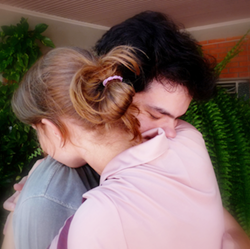Contributor: W. Travis Stewart, LPC, NCC writer for Addiction Hope
 Not so long ago I was talking with one of my mentors, discussing patterns in my life that I wanted to change. In the course of the conversations I said, “That’s the way I’ve always been.”
Not so long ago I was talking with one of my mentors, discussing patterns in my life that I wanted to change. In the course of the conversations I said, “That’s the way I’ve always been.”
What he said next surprised and challenged me.
“You mean, that’s way you have been up til now.”
He wasn’t asking a question. He was verbalizing his belief that I could make changes to my life regardless of what has happened in the past.
Of course, as a professional counselor, I should know this, right? It’s not so easy to see your own blind spots. Even harder to change them.
Many of us believe that what has happened in the past defines us. Clients will often talk of past harm or abuse done to them as unchangeable declarations of who they are.
“But my dad didn’t love me…” a client might say, refusing to learn to see himself from any other perspective.
“But I had an abortion” another may respond, as if this choice 15 years ago has the power to forever mark her as a failure.
 This tendency to view our character qualities or life circumstances as fixed in stone is called the “fixed mindset” by researcher and psychologist Carol Dweck in her book Mindset; How We Can Learn to Fulfill Our Potential and it can have long-lasting negative impacts on our health, mood, relationships, careers and even recovery.
This tendency to view our character qualities or life circumstances as fixed in stone is called the “fixed mindset” by researcher and psychologist Carol Dweck in her book Mindset; How We Can Learn to Fulfill Our Potential and it can have long-lasting negative impacts on our health, mood, relationships, careers and even recovery.
On the other hand is what Dweck calls the “growth mindset.” If the fixed mindset says, “This is the way I’ve always been” the growth mindset responds, “This is the way I’ve been up til now.”
If you are working Steps 8 and 9 and are actively working on making amends to others, you will also need to be changing the way you see yourself.
In the process of making amends with humility and honesty, you will be reminded of the many ways you have hurt others. This will be painful. You will be tempted to call yourself a failure, a fool or a hopeless loser. That would be the fixed mindset. That would be getting stuck in the past.
Moving into the future does not mean telling yourself a fictional fantasy. It doesn’t mean playing make-believe.
Moving into the future means owning the past but not being defined by it.
 Dweck writes, “Even in the growth mindset, failure can be a painful experience. But it doesn’t define you. It’s a problem to be faced, dealt with, and learned from.”
Dweck writes, “Even in the growth mindset, failure can be a painful experience. But it doesn’t define you. It’s a problem to be faced, dealt with, and learned from.”
This would mean telling yourself, “Yes, I made those choices. Yes my addiction has caused others great pain. Yes, I regret my past mistakes. And, yes, I’m going to move forward.”
Whether Dr. Dweck has a faith perspective on life or not, her research supports a central belief of Christianity; we can be made new.
Jesus, in Revelation 21:5 declares what his work is all about, “Behold, I am making all things new.”
The New Testament is full of stories of people being made new. One of my favorites is the story of the lost son in Luke 15. This young man rejected his father, wasted his inheritance on “reckless living” and, after finding himself at the end of his resources, planned to return home and do his best to act like his compliant yet, bitter older brother.
His father has none of it. His father’s plan is not to turn the younger brother into a compliant yet, bitter son as well. His plan is to see him transformed.
 He grants him a new identity. He treats him like royalty. He establishes a new kind of relationship, one based on the father’s grace rather than the son’s performance. The son is now, neither an angry, rebellious son, nor is he a bitter but obedient son. He is now a beloved son. He tells all who would hear him, “For this my son was dead, and is alive again; he was lost, and is found.’ And they began to celebrate.”
He grants him a new identity. He treats him like royalty. He establishes a new kind of relationship, one based on the father’s grace rather than the son’s performance. The son is now, neither an angry, rebellious son, nor is he a bitter but obedient son. He is now a beloved son. He tells all who would hear him, “For this my son was dead, and is alive again; he was lost, and is found.’ And they began to celebrate.”
Like the younger brother who saw his past and owned it, the Steps require a humility to move forward. In this sense, the 12 Steps are a form of dying and being made new. They involve moving from an old pattern for relationships into a new one.
The humility required to work each steps puts the old self to death. With each step completed a part of your old way of thinking and acting dies. With each step a new part of you is born again. Through the process you don’t become a completely new person but you do become a person who is able to say, “This is how I used to live, up til now.”
Community Discussion – Share your thoughts here!
In addiction recovery have you or your loved one experienced helping others and encouraging them to look toward their future and new way of thinking rather than focusing on their past? What advice do you have to share?
About the author:
Travis Stewart earned a Master of Arts in Counseling (2001) and a Master of Arts in Theological Studies (2003), both from Covenant Seminary in St. Louis, MO. Travis is a Licensed Professional Counselor in the State of Missouri and a writer for Eating Disorder Hope and Addiction Hope.
The opinions and views of our guest contributors are shared to provide a broad perspective of addictions and co-occurring disorders. These are not necessarily the views of Addiction Hope, but an effort to offer a discussion of various issues by different concerned individuals. We at Addiction Hope understand that addictions result from a combination of environmental and genetic factors. If you or a loved one are suffering from an addiction, please know that there is hope for you, and seek immediate professional help.
Last Updated & Reviewed By: Jacquelyn Ekern, MS, LPC on October 9, 2015, 2015. Published on AddictionHope.com
